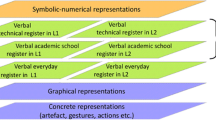Abstract
The purpose of this study was to investigate language related difficulties and the language of cognitive processes of English-Korean bilingual students in solving mathematics word problems. Qualitative case study research methodology was used to collect, analyze, and present data. The principle of purposeful sampling was used to select six English-Korean bilingual students. Different types of bilinguals revealed distinct patterns of difficulties and languages in solving mathematics word problems written in English and Korean. Children in the transition stage that is unstable and changing revealed more difficulties in solving the mathematics word problems overall.
Similar content being viewed by others
References
CarpenterT. P.: 1985, ‘Learning to add and subtract: An exercise in problem solving’, in SilverE. A. (ed.), ‘Teaching and Learning Mathematical Problem Solving: Multiple Research Perspectives’, Lawrence Erlbaum Associates, Publishers, Hillsdale, NJ, pp. 17–40.
ClementsM. A.: 1980, ‘Analyzing children's errors on written mathematical tasks’, Educational Studies in Mathematics 11 (1), 1–21.
CockingR. R. and MestreJ. P.: 1988, ‘Linguistic and Cultural Influences on Learning Mathematics’, Lawrence Erlbaum Associates, Publishers, Hillsdale, NJ.
CorteE. D. and VerschaffelL. V.: 1987, ‘The effect of semantic structure on first grader's strategies for solving addition and subtraction word problems’, Journal for Research in Mathematics Education 18 (5), 363–381.
CulmminsJ.: 1981, ‘Linguistic interdependence and the educational development of bilingual children’, Review of Educational Research 49 (2), 222–251.
CuevasG. J.: 1984, ‘Mathematics learning in English as a second language’, Journal for Research in Mathematics Education 15 (2), 134–144.
DurkinK. and ShireB. (1991), ‘Language in Mathematical Education: Research and Practice’, Open University Press, Philadelphia.
GlaserB. G. and StraussA. L.: 1967, ‘The Discovery of Grounded Theory’, Aldine, Chicago.
Ishida, T.: 1986, ‘Issues of language factors and performance of Japanese pupils in word problem solving’, in Becker, J. P. and Miwa, T. (eds.), Proceedings of the U.S.-Japan Seminar on Mathematical Problem Solving, Southern Illinois University, Carbondale, IL, pp. 255–272.
LabordeC.: 1990, ‘Language and mathematics’, in NesherP. and KilpatrickJ. (eds.), ‘Mathematics and Cognition: A Research Synthesis by the International Group for the Psychology of Mathematics Education’, Cambridge University Press, Cambridge, pp. 53–69.
MattewsW.: 1984, ‘Influences on the learning and participation of minorities in mathematics’, Journal for Research in Mathematics Education 15 (2), 84–95.
MerriamS. B.: 1991, ‘Case Study Research in Education: A Qualitative Approach’, Jossey-Bass, Publisher, San Francisco.
MoyerJ. C., SowderL., Threadfill-SowderJ. and MoyerM. B.: 1984, ‘Story problem formats: drawn versus verbal versus telegraphic’, Journal for Research in Mathematics Education 15 (5), 342–351.
MuthK. D.: 1986, ‘Solving word problems: middle school students and extraneous information’, School Science and Mathematics 86 (2), 108–111.
NesherP., GreenoJ. G. and RileyM. S.: 1982, ‘The development of semantic categories for addition and subtraction’, Educational Studies in Mathematics 13 (4), 373–393.
NewmanM. A.: 1977, ‘An analysis of 6th grade pupils' error on written mathematical tasks’, in ClementsM. and FoysterJ. (eds.), ‘Research in Mathematics Education in Australia’, Hutchinson, Inc., Melbourne, pp. 64–73.
PattonM. Q.: 1980, ‘Qualitative Evaluation Methods’, Sage, Newbury Park, CA.
PiagetJ.: 1959, ‘The Language and Thought of the Child’, The Humanities Press, Inc., New York.
PolyaG.: 1962, ‘Mathematical Discovery: On Understanding Learning and Teaching Problem Solving’, Vol. 1, Wiley, New York.
SowderL.: 1988, ‘Choosing operations in solving routine story problems’, in CharlesR. I. and SilverE. A. (eds.), ‘The Teaching and Assessing of Mathematical Problem Solving’, NCTM, Reston, VA, pp. 148–158.
VygotskyL. S.: 1962, ‘Thought and Language’, MIT Press, Cambridge.
WhorfB.: 1956, ‘Language, Thought and Reality’, MIT Press, Cambridge.
Whang, W.: 1992, An Investigation of Language Related Difficulties of Students Who Speak English as a Second Language in Solving Arithmetic Word Problems, unpublished manuscript.
ZeppR.: 1982, ‘Bilingual's understanding of logical connections in English and Sesotho’, Educational Studies in Mathematics 13 (2), 205–221.
ZeppR.: 1987, ‘Common logical errors in English and Chinese’, Educational Studies in Mathematics 18 (1), 1–17.
ZeppR.: 1989, ‘Language and Mathematics Education’, API Press, Hong Kong.
Author information
Authors and Affiliations
Additional information
This article is a summary of doctoral dissertation under the direction of James W. Wilson at the University of Georgia.
Rights and permissions
About this article
Cite this article
Whang, WH. The influence of English-Korean bilingualism in solving mathematics word problems. Educ Stud Math 30, 289–312 (1996). https://doi.org/10.1007/BF00304569
Issue Date:
DOI: https://doi.org/10.1007/BF00304569




